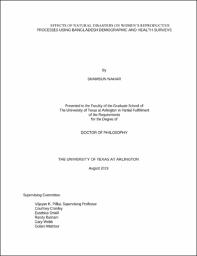| dc.description.abstract | Bangladesh is widely recognized as one of the most disaster-prone countries in the world. It is predicted that disaster-related losses in Bangladesh will be higher by 2025 compared with all other countries (Smith, 2012). All individuals or communities are not vulnerable to natural disasters equally. Women in Bangladesh are disproportionately more vulnerable to natural hazard due to social norms, entrenched gender inequality, and reproductive responsibilities (Ahmad, 2012, Rezwana, 2018; Tanny, Rahman, & Ali, 2017). The immediate effects of natural disasters are found in marital disruptions, unplanned pregnancy, lack of access to contraception and contraceptive use, abortion, lack of antenatal perinatal care, poor birth outcomes and infant health, vulnerable psychosocial health, and high fetal and infant mortality (Currie & Rossin-Slater, 2013; Brock et al., 2015; Djafri, Chongsuvivatwong, & Geater 2015; Grabich et al., 2016; Harville et al., 2015; Sugawara et al., 2016; Torche & Kleinhaus, 2011).
A natural disaster, cyclone Sidr, hit Bangladesh on November 15, 2007, and affected a total of l 8.9 million people (UNICEF, 2007). The current study aims to understand: (a) the effects of cyclone Sidr on women’s reproductive processes and (b) the effects of well-known reproductive health determinants on the three phases of reproduction in a disaster prone country, Bangladesh. The current study examines the effects of cyclone Sidr on women’s intercourse, conception, and gestation phases using a conceptual framework along with a difference-in-differences approach. It also examines the effects of education, wealth, and place of residence on women’s intercourse, conception, and gestation phases net of the effect of Sidr. The Bangladesh Demographic Health Surveys (BDHS) is analyzed in the study using logistic regression. It is found that women’s gestation phase was disrupted by cyclone Sidr in Bangladesh and education level, wealth status, and place of residence are important reproductive health determinants in women’s reproduction net of the effect of Sidr. This study attempted to address women’s reproductive health issues in the context of disaster. Implications for social work theory, research, practice, and policy are discussed in the study. The conceptual framework proposed in the study can be utilized in understanding the effects of natural disasters in developing countries on women’s reproductive processes. The study provides generalizable findings and suggests gender focused disaster management and policies. | |


